What are the Five Days of Diwali? Kids Should Know!

Yes, it’s that time of the year when the festival of Diwali has arrived in all its splendour and gaiety! However, it is also that time of the year that cannot be missed at any cost since it holds so many valuable learnings and values that inspire kids! So, brace yourself up and get all set to make the most of this festival filled with great festivity and rejoicing for kids. This blog not only touches upon why Diwali is celebrated, but it also explores the five days of Diwali that kids should know primarily.
What is Diwali and Why is it Celebrated?
Diwali is also known as Deepavali, where “Deepa” stands for “clay lamps” and “avali” stands for “row”. In other words, Diwali is a five-day festival of lights that is celebrated not only by Hindus but also by Jains, Buddhists, and Sikhs. This festival eternally celebrates the victory of good over evil, knowledge over ignorance, and light over darkness. It is, therefore, no wonder that Diwali holds great significance, not just as a major festival across India but also as a treasure filled with teachings that help build children’s strong character and minds.
Understanding the Significance of The Five Days of Diwali
As mentioned earlier, Diwali is a festival celebrated across five days. Did you know that each day of Diwali has its own rituals and religious significance? To raise kids as individuals rooted in their cultural heritage, it is important to explain the five days of Diwali to them. This prepares them to take on the futuristic world Here is what they all need to know for now.
Day 1: Dhanteras
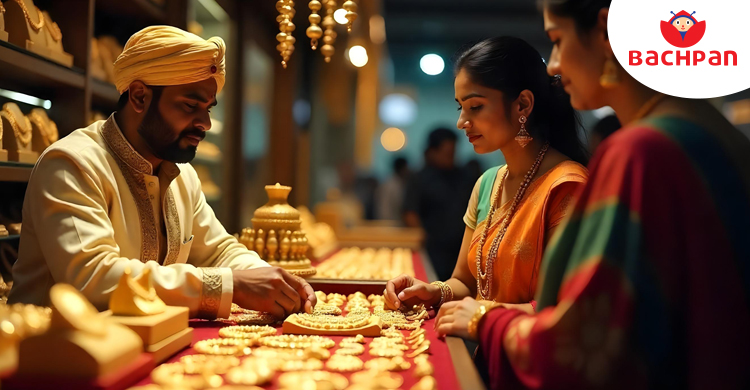
As the name suggests (where “Dhan” means “wealth” and “teras” means “the thirteenth day of the Indian calendar”), Dhanteras is the first day that celebrates wealth and marks preparation for the upcoming Diwali celebrations. On this day, people buy jewellery made of gold and silver, acquire new assets, and procure new utensils. They welcome Goddess Laxmi into their homes, as she bestows wealth, prosperity, and good fortune on her devotees. The auspicious day of Dhanteras is a perfect opportunity to acquaint kids with Indian mythology and teach them the values of sharing and caring. It also engages them in activities such as donating old clothes and toys.
(Also Read, Best Diwali Art & Crafts for Preschool Kids )
Day 2: Naraka Chaturdashi (Choti Diwali)
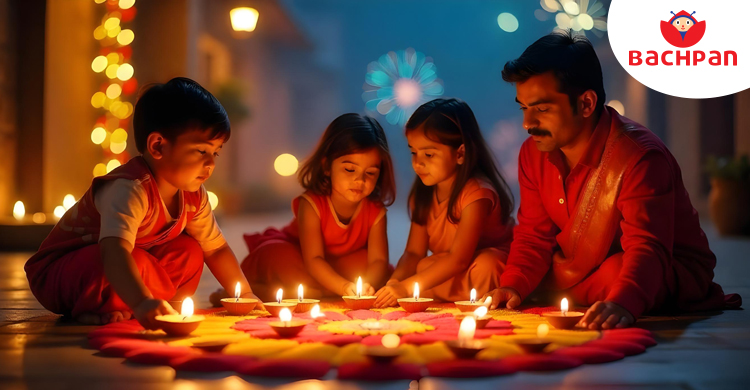
Naraka Chaturdashi is celebrated a day before Diwali, and this day is also called “Choti Diwali”. There are many different versions of the stories behind Naraka Chaturdashi. One of the most popular versions is that Lord Krishna, his wife Satyabhama, and Goddess Kali slew the demon king Narakasur on this day. In the context of teaching values to kids, Naraka Chaturdashi emphasizes the significance of teamwork. It encourages standing against injustice to achieve a common goal.
Day 3: Lakshmi Puja (Diwali)
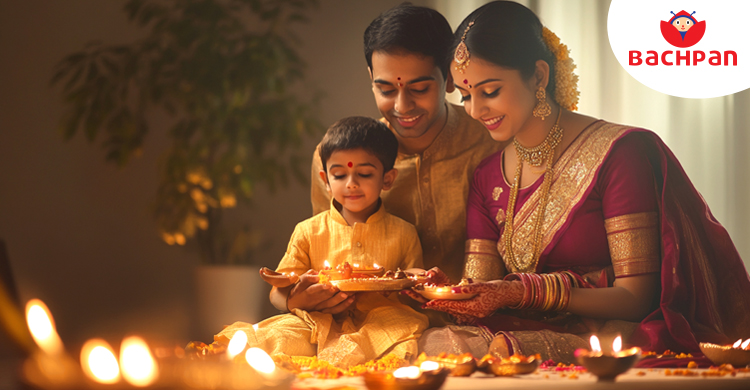
The main Diwali festival falls on the third day when the entire family gathers together. They offer their prayers to Goddess Laxmi on the darkest night of the month in the Indian calendar. It is said that on this day, Lord Rama returned to Ayodhya after his fourteen-year exile. It is also said that Goddess Laxmi got married to Lord Vishnu on this day. Diwali thus celebrates fresh beginnings. In addition to enticing kids with feasts and festivities, it’s a great opportunity to act out Diwali stories. It also engages them in practising gratitude and goodwill.
Day 4: Govardhan Puja (Annakut)
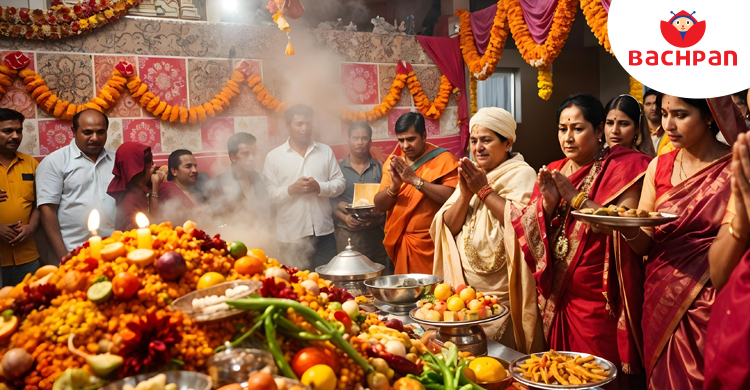
Also known as Annakut, Govardhan Puja commemorates the day when Lord Krishna lifted the Govardhan Hill on his little finger. In Hindu mythology, Lord Krishna regarded as an incarnation of Lord Vishnu, did this to protect the people of Vrindavan from the heavy rain caused by Lord Indra’s anger. Govardhan Puja is, in essence, a reminder to develop humility and protect, respect, and appreciate the bounties of nature. It is a great day to make children connect with the environment around them through various nature activities.
(Also Read, Fun and Creative Dussehra Activities for Preschool )
Day 5: Bhai Dooj
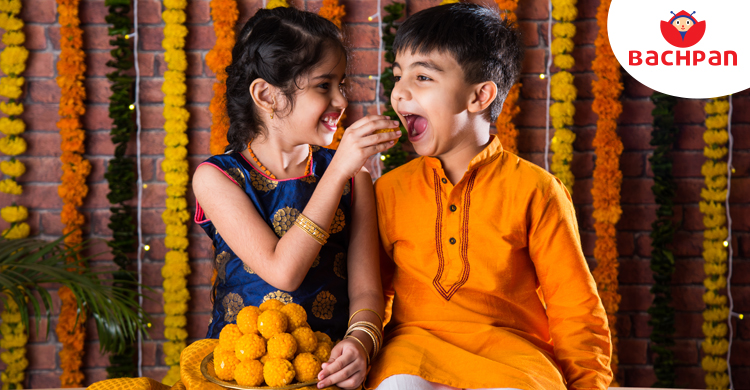
Bhai Dooj is one of those few festivals that celebrate the timeless bond between brothers and sisters. It is said that Lord Krishna visited his sister Subhadra on this day after he defeated the demon king Narakasur. Lord Yama (who is the “God of Death”) is also said to have visited his sister Yami for protection and well-being. Hence, as much as it is a wonderful day to bring kids together and celebrate their sibling bond, it is also a wonderful day to engage kids in fireless cooking and make those special desserts for Bhai Dooj with a dash of mythology.
What Diwali Teaches Us: Key Values to Inspire Kids
What Diwali can teach kids is much more than the eternal victory of good over evil, light over darkness, and knowledge over ignorance. While each one of the five days of Diwali has its significance, the five key values that kids can be inspired by are as follows:
1. The value of self-discipline and modesty (of which Lord Rama himself was a master)
2. The value of choosing to be friends with good people and cherishing their company
3. The value of keeping one’s promises and honouring one’s commitments even when circumstances create hardships
4. The value of love and devotion (primarily epitomised by Lord Hanuman)
5. The value of unity, togetherness, and staying rooted in one’s roots
Conclusion
The five-day festival of Diwali is all about love, light, and gratitude. The people of Ayodhya expressed this by lighting ‘diyas’ and decorating homes when Lord Rama returned from his exile. Today’s kids are tomorrow’s leaders, hence the significance of the five days of Diwali for kids grows manifold. As parents, educators, and guardians, it is our prime duty to inculcate cultural values in them. We must also give them a strong foundation for a dynamic future. At Bachpan Play School, we carry out this duty with the utmost sincerity for kids’ overall growth.



